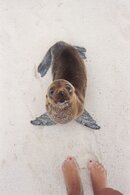Really? Everything isnt meant, nor intended to be owned. Even if the author didnt want his article to be reprinted, I dont think it should matter, especially when the information benefits the community and could possibly save another persons life.
The information can be referenced without full reproduction to the same end. Our convenient access to the information does not override the author's legal rights to his own content. The incident is "news" if someone wants to write it up in their own words, and there you might reference the original article as a source for the information presented. That's different from a cut/paste of someone else's entire article. Try doing that with any AP article and you better have your attorney on retainer if they find out about it.
I totally agree that the information should be accessible if it can help to save lives, but the ends don't justify the means. Laziness is not an excuse for copyright violation. At least I don't think it is a valid one.
Copyright law does allow ScubaBoard to ignore the violation until the owner objects, but that's the letter of the law. Personally, I would much rather see a policy that respects copyright holders by prohibiting the substantial reproduction of their work without permission. It's easy enough to summarize and attribute, or to provide a link if the information is important.





